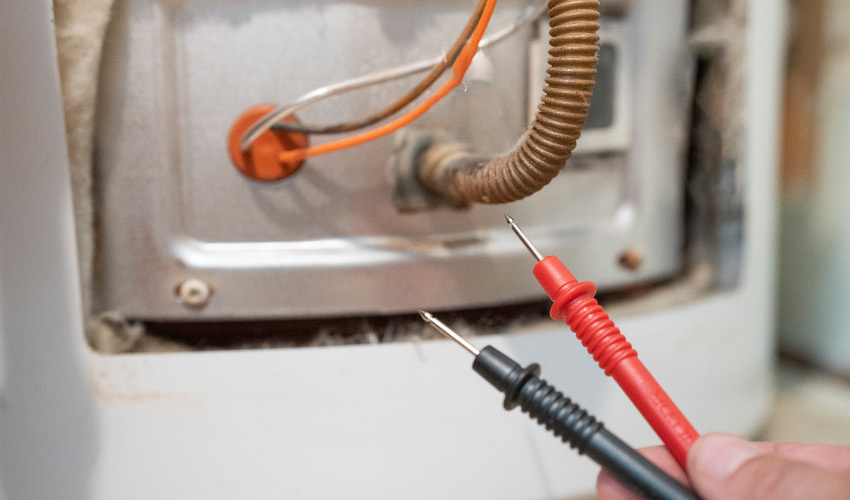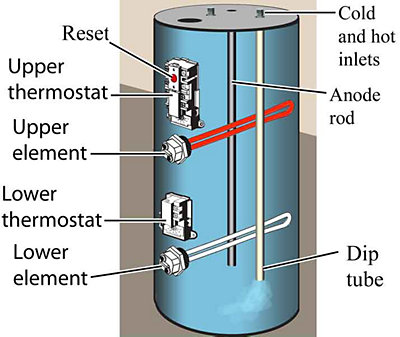Gas water heaters do not have electric heating elements. Instead, they use a gas burner to heat water.
Gas water heaters are popular for their efficiency and quick heating capabilities. Unlike electric models, they rely on natural gas or propane. This method provides a steady supply of hot water, making them ideal for households with high demand. Gas water heaters typically heat water faster than electric units, which can save time during peak usage.
They also tend to be more cost-effective in the long run, especially in areas with low gas prices. Understanding how gas water heaters operate helps homeowners choose the right system for their needs, ensuring reliable hot water access throughout the year.
Page Contents
- 1 Introduction To Gas Water Heaters
- 2 Components Of A Gas Water Heater
- 3 Heating Elements In Water Heaters
- 4 The Water Heating Process
- 5 Advantages Of Gas Water Heaters
- 6 Myths About Gas Water Heaters
- 7 Maintenance And Safety
- 8 Choosing The Right Water Heater For Your Home
- 9 Environmental Impact And Regulations
- 10 Future Of Water Heating Technology
- 11 Conclusion
Introduction To Gas Water Heaters
Gas water heaters use burners to heat water. They do not have heating elements like electric heaters. Instead, they rely on gas combustion. This process creates hot gases that heat the water tank. Gas heaters often heat water faster than electric ones.
In a gas water heater, the thermostat controls the temperature. It tells the burner when to turn on and off. This ensures water stays at the right warmth.
Comparing gas to electric heaters shows some clear differences. Gas heaters usually cost less to operate. They also provide hot water more quickly. On the other hand, electric heaters can be easier to install.

Credit: www.mrrooter.com
Components Of A Gas Water Heater
The main components of a gas water heater include the gas burner, thermostat, and control valve. The gas burner heats the water directly. It ignites gas to create flames. These flames warm the water in the tank. Proper operation of the burner is crucial for efficiency.
The thermostat controls the water temperature. It senses the water’s heat level. When the water cools, the thermostat signals the control valve. The control valve then releases more gas to the burner. This process keeps the water at a consistent temperature.
Heating Elements In Water Heaters
Electric heating elements are used in electric water heaters. They heat water by passing electricity through a coil. This coil gets hot and warms the water around it.
Gas water heaters do not use electric heating elements. Instead, they rely on a gas burner. The burner heats the water directly. This method is often faster than electric heaters.
Gas models have a flame that heats the tank. The flame is controlled by a thermostat. This keeps the water at the desired temperature.
In summary, gas water heaters utilize a different method for heating. They are efficient and effective without electric heating elements.
The Water Heating Process
Gas water heaters use gas burners to heat water. The process starts with igniting the gas. A thermostat controls the burner, ensuring the water reaches the desired temperature.
Once ignited, the flame heats the water in the tank. This heat transfer occurs through the tank walls. Hot water rises to the top, while cooler water stays below.
This method is efficient and fast. Users enjoy a steady supply of hot water for their needs. Overall, gas water heaters offer a reliable solution for heating water.
Advantages Of Gas Water Heaters
Gas water heaters offer great energy efficiency. They use less energy than electric models. This leads to lower utility bills for homeowners. Many gas heaters heat water faster. This means hot water is available quickly when needed.
Operational costs for gas water heaters are usually lower. Natural gas is often cheaper than electricity. This makes gas heaters a popular choice for many families. Regular maintenance can also keep costs down. Keeping the unit in good condition ensures it runs efficiently.
Myths About Gas Water Heaters
Many people believe that gas water heaters have heating elements. This is not true. Gas water heaters use burners to heat water. These burners ignite gas to create flame. This flame heats the water in the tank.
Some think gas heaters are less efficient. In reality, they can heat water faster than electric models. They often cost less to operate, too. This makes them a popular choice for many homes.
Another myth is that gas heaters are unsafe. Modern gas water heaters come with safety features. These include automatic shut-off valves and flame sensors. Regular maintenance helps keep them safe and efficient.
Maintenance And Safety
Routine inspections are crucial for ensuring your gas water heater functions safely. Check the ventilation system regularly to prevent gas buildup. A well-ventilated area helps maintain proper air flow.
Look for any signs of gas leaks. A hissing sound or a smell like rotten eggs indicates a leak. If detected, turn off the gas supply immediately and call a professional.
Regularly clean the heater and its components. Dust and debris can affect performance. Inspect the burner and thermocouple for any signs of wear.
Maintaining your gas water heater ensures long-lasting performance and safety for your home.
/replace-the-heating-element-water-heater-1824886-11-082cb081cf2740fca47a30001cb701a1.jpg)
Credit: www.thespruce.com
Choosing The Right Water Heater For Your Home
Choosing the right water heater for your home is essential. Assessing your needs helps you find the best option. Think about how much hot water you use daily. Size and energy efficiency matter too. A larger family may need a bigger unit.
Installation considerations play a crucial role. Check the available space in your home. Make sure there is proper ventilation for gas units. Look for local codes or permits needed for installation. Always hire a licensed professional for safety and compliance.
Environmental Impact And Regulations
Gas water heaters produce emissions that can affect our environment. These emissions include carbon dioxide and nitrogen oxides. They contribute to air pollution and climate change.
Current industry standards aim to reduce these harmful effects. New regulations focus on energy efficiency and lower emissions. Manufacturers are encouraged to create eco-friendly models.
| Emissions Type | Impact |
|---|---|
| Carbon Dioxide (CO2) | Contributes to global warming |
| Nitrogen Oxides (NOx) | Affects air quality and health |
Future Of Water Heating Technology
New technologies are changing water heating. Innovations focus on energy efficiency and sustainability. Many companies explore solar power and heat pumps. These options help reduce carbon footprints.
Smart water heaters are also emerging. They offer real-time monitoring and remote control. Users can adjust settings from their phones. This leads to better energy management.
Transitioning to sustainable options is crucial. It helps save money and the environment. Many households can benefit from these advanced systems.
| Technology | Benefits |
|---|---|
| Solar Water Heaters | Utilizes sunlight, reduces energy costs |
| Heat Pumps | Efficient, lower emissions |
| Smart Water Heaters | Remote control, energy savings |

Credit: www.mrplumberatlanta.com
Conclusion
Gas water heaters do not use electric heating elements. Instead, they rely on burners to heat water efficiently. Understanding how they operate can help you choose the right system for your needs. By knowing the differences, you can make informed decisions, ensuring you get the best value for your investment.
